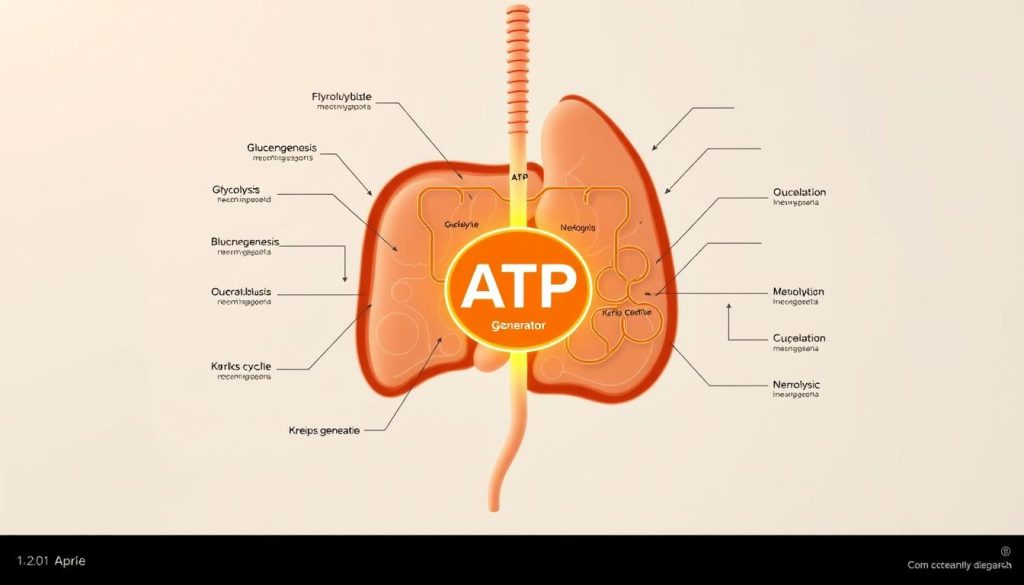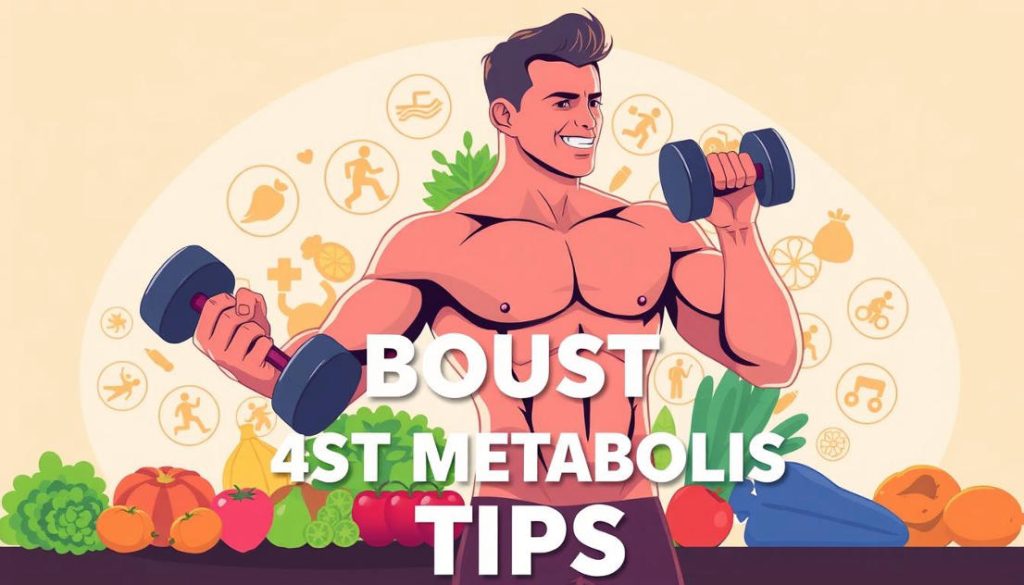How To Increase Metabolism Metabolism is the way that our bodies transform food into energy. It’s fundamental to life, providing us with the power for everything from breathing to movement.
How To Increase Metabolism
Boost Your Metabolism: 7 Proven Tips to Boost Metabolism
Do you feel like you’re moving through life in slow motion? Can speeding up your metabolism really change your body? Yes, it can. Speeding up your metabolism will make you burn more calories, shed pounds, and increase your health.
We will examine 7 tips that have been proven to enhance your metabolism. These are easy dietary changes and efficient exercise regimes. By incorporating these tips in your life, you are able to drive up your metabolic rate and observe actual results.
Read More: What Foods Speed Up Female Metabolism

Key Takeaways
Easy dietary modifications can enhance metabolism
Efficient exercise regimes can enhance metabolic rate
Pairing diet and exercise can promote amazing weight loss
Increasing metabolism can improve overall health
7 proven tips that are going to get you started
Understanding Metabolism: What It Is and Why It Matters
Metabolism is the way that our bodies transform food into energy. It’s fundamental to life, providing us with the power for everything from breathing to movement. Many believe it’s solely losing or gaining weight. But it’s so much more, and it impacts our health and happiness.
The Science Behind Metabolism
Metabolism is a chain of chemical reactions that transform nutrients to energy. It is composed of two components: breaking down complicated molecules (catabolism) and constructing them (anabolism). The basal metabolic rate (BMR) indicates how many calories our body uses just to exist.
Knowing metabolism also implies understanding what influences it. For instance, thyroid hormones are very important, and diseases such as hypothyroidism slow it down.
Factors That Affect Your Metabolic Rate
Many things can change how fast your metabolism works. Age, genetics, sex, weight, and lifestyle all play a part. For instance, having more muscle helps because muscles need more energy than fat.
This is why strength training is good for your metabolism. It helps keep your muscles strong and active.
- Factor
- Impact on Metabolic Rate
- Age
- Metabolic rate slows down with age
- Muscle Mass
- Increases metabolic rate
- Genetics
- Can influence metabolic rate
- Hormonal Imbalance
- Can affect metabolic rate
How To Boost Metabolism: The Basics
Understanding metabolism is important for increasing your metabolic rate. Metabolism converts food to energy. Metabolism is influenced by genetics, age, and lifestyle.
Basal Metabolic Rate Defined
Basal Metabolic Rate (BMR) is the calories your body requires for normal functions such as breathing and the production of cells. It’s the largest portion of your daily caloric utilization. Your BMR informs you as to how many calories you require for healthy metabolic functioning.
Metabolism Myths Myths: Debunked
Several myths are confusing individuals about increasing their metabolism. Some believe that certain foods can highly accelerate metabolism. Others are convinced that metabolism significantly decreases with age. However, the reality is, some foods can slightly increase metabolism, and it also slows down with age. But, life choices have an impact on it.
Signs of a Sluggish Metabolism
Experiencing constant tiredness, gaining weight, or constantly being cold could indicate that you have a slow metabolism. And struggling to lose weight and getting tired after meals are indicators. Checking for these can allow you to make adjustments to increase your metabolism.
By understanding your BMR, debunking metabolism myths, and recognizing symptoms of a sluggish metabolism, you’re half-way there. You can begin enhancing your metabolic rate and health.
Tip 1: Maximize Your Protein Intake
Increasing your metabolic rate begins with the optimal level of protein. Protein is central to your body’s health. Discovery of how to consume a sufficient amount of protein can be of real assistance to your metabolism.
The Thermic Effect of Protein
Protein is more energy-intensive to digest than fats or carbs. Your body uses more calories when you consume protein. Incorporating high-protein foods into your diet can really kick up your metabolism.
Recommended Protein Sources
There are numerous sources of protein. They come in two broad categories: animal proteins and plant proteins.
Animal-Based Proteins
Animal proteins are rich in essential amino acids. Chicken, fish, eggs, and dairy products are excellent. They aid muscle repair and muscle growth.
Plant-Based Proteins
Plant proteins occur in legumes, beans, lentils, tofu, and nuts. They are deficient in some amino acids, but combining them may give your body all the essentials. Quinoa is a complete plant protein.
Creating a Protein-Rich Meal Plan
To have sufficient protein, think ahead to your meals. Eat protein at every meal. For instance, have Greek yogurt for breakfast, chicken breast that’s been grilled for lunch, and salmon for supper. Keeping things varied will guarantee you receive all the nutrients.
Read More: Fat Burning Foods For Belly Fat
Here’s a meal plan each day:
Breakfast: Greek yogurt with nuts and berries
Lunch: Grilled chicken breast and quinoa and vegetables
Dinner: Baked salmon and sweet potatoes and green beans
Snack: Cottage cheese with fruit
Tip 2: Strength Training for Metabolic Enhancement
Building muscle through strength training boosts your metabolic rate. Metabolism is not just about your weight; it’s about how your body uses energy. Strength training increases muscle mass, which raises your resting metabolic rate (RMR).
How Muscle Mass Impacts Metabolism
Muscle tissue requires more energy than fat tissue. Therefore, the greater your muscle mass, the faster your metabolic rate. Strength training can really ramp up your metabolic rate, allowing you to burn more calories throughout the day.
Good Strength Training Programs
In order to increase your metabolism, include a well-planned strength training program in your exercise routine. Incorporate compound exercises such as squats, deadlifts, and bench presses. These exercises engage many muscles simultaneously.
Beginner-Friendly Exercises
For beginners, start with bodyweight training or minimal weight. Push-ups, lunges, and dumbbell rows are excellent choices for beginners.
Progressive Overload Techniques
To continue building muscle and increasing your metabolic rate, intensify your workouts. Implement progressive overload techniques such as heavier weights, additional reps, or sets in the long run.
Incorporating Resistance Training Into Your Schedule
To maximize benefits from strength training, perform resistance exercises two to three times a week. Consistency is essential. Be sure to allow your muscles time to recover between sessions for growth and metabolic boost.
Tip 3: High-Intensity Interval Training (HIIT)
HIIT is an effective method of accelerating your metabolism and getting in shape. It consists of brief, intense exercise with rapid resting intervals. These resting intervals can be low-intensity movement or rest.
The Science of HIIT and Metabolism
Research indicates HIIT increases your metabolic rate. It consumes calories during and after exercise. This is due to the fact that HIIT causes your body to require a higher amount of oxygen, thus increasing your metabolic rate.
Sample HIIT Workouts for Beginners
Beginners can begin with simple HIIT routines. These two are easy routines:
10-Minute HIIT Starter Routine
Warm-up: 1 minute of jogging lightly
30 seconds of burpees and then 30 seconds rest
30 seconds of jump squats and 30 seconds rest
30 seconds of mountain climbers and 30 seconds rest
Repeat for 10 minutes
Cool-down: 1 minute stretch
Equipment-Free HIIT Workouts
HIIT does not require any equipment. You may use sprints, push-ups, lunges, and plank in the routine. This is convenient to perform anywhere.
Read More: High-protein weight loss

Advanced HIIT Techniques for Maximum Results
As you become more proficient at HIIT, attempt more challenging workouts. You can accomplish this by:
Extending the length of high-intensity intervals
Shortening resting times between intervals
Adding more difficult exercises or weights to bodyweight exercises
By challenging yourself more, you can continue to enhance your metabolism and achieve your fitness objectives.
Tip 4: Metabolism-Boosting Foods and Drinks
Incorporating some foods and beverages in your diet can actually give your metabolism a boost. The right nutrients in a balanced diet can increase your metabolic rate. This will make losing weight and maintaining good health easier.
Spicy Foods and Their Thermogenic Effect
Spicy foods, especially those with capsaicin like chili peppers, can make your body heat up. This boosts your metabolism. Capsaicin also helps break down fat by releasing certain neurotransmitters, leading to weight loss.
Green Tea and Other Beneficial Drinks
Green tea benefits from being a metabolism booster. Green tea catechins, particularly EGCG, have a beneficial impact on your metabolic rate. Regular consumption of green tea can enhance fat burning and metabolic health. Black coffee and certain herbal teas also enhance metabolism.
Nutrient-Dense Foods That Support Metabolic Health
Nutrient-rich foods are central to a healthy metabolism. They provide your body with the vitamins, minerals, and nutrients it requires for metabolic function.
Metabolism-Boosting Fruits and Vegetables
Vegetables and fruits are full of antioxidants, fiber, and nutrients that promote metabolic health. Leafy green vegetables, citrus fruits, and berries are particularly helpful.
Healthy Fats for Metabolic Function
Healthy fats, such as those in avocados, nuts, and olive oil, play a critical role in metabolism. They assist in making hormones and facilitating nutrient absorption.
- Food
- Nutritional Benefit
- Metabolic Impact
- Chili Peppers
- High in capsaicin
- Increased fat breakdown, thermogenic effect
- Green Tea
- High in catechins (EGCG)
- Increased fat burning, metabolic rate boosted
- Avocados
- High in healthy fats
- Assists with hormone production, helps with nutrient absorption
Tip 5: Strategic Meal Timing and Frequency
Altering the way you eat can actually improve your metabolism. When and how frequently you eat influences the efficiency with which your body metabolizes calories. Let’s discuss how frequently to eat, the advantages of fasting, and how to eat in a meal plan.
The Impact of Meal Frequency on Metabolism
The frequency of eating can alter your metabolism. Some research indicates that eating frequently in small portions can keep your body burning calories more. But, other research finds that how frequently you eat doesn’t matter as long as you’re not overeating. “The most important thing is to find a meal schedule that works for your life,” says a dietitian.
Intermittent Fasting: Friend or Foe to Metabolism?
Intermittent fasting is a type of diet that includes fasting or reducing food intake for periodic intervals. Other people believe that it can improve their metabolism by enhancing how their body processes insulin and produces more growth hormone. However, one must exercise caution when fasting, particularly if pregnant or with a history of eating disorders.
Read More: Exercise To Reduce Belly Fat
- Designing an Ideal Eating Routine
- For maximum benefit from your meals, use these guidelines:
- Eat a balanced meal consisting of protein, healthy fats, and carbs.
- Space your meals so that you maintain an even energy level.
- Eat according to your hunger and fullness cues.
- Pre and Post-Workout Nutrition
- Pre- and post-workout nutrition is crucial. Pre-workout, eat a combination of carbs and protein 30 minutes prior to training. Post-training, consume a snack consisting of carbs and protein in 60 minutes.
Nighttime Eating Considerations
Having too much food at night can interfere with your sleep. Attempt to eat your evening meal a minimum of 2-3 hours before bedtime. If you require a snack, select something light and balanced.
By being mindful of what you’re eating, you can support your metabolism and your health in general. Experiment with various forms to determine what works best for you.
Tip 6: Quality Sleep and Stress Reduction
Adequate sleep and stress management are crucial in optimizing your metabolism. Stress or lack of sleep can cause damage to your metabolic well-being. It can decelerate your metabolism and compromise the health of your body.
How Sleep Deprivation Affects Metabolic Rate
Sleeping fewer hours can actually make your metabolism slower. When you don’t get enough sleep, your body produces more cortisol, a stress hormone. This can cause you to store extra fat and decelerate your metabolism.
- Main effects of sleep loss on metabolic rate are:
- Decreased sensitivity to insulin
- Higher levels of cortisol
- Increased fat storage
- Lowered levels of leptin (the fullness hormone)
Stress Hormones and Their Effect on Metabolism
Stress prompts your body to release stress hormones such as cortisol and adrenaline. These hormones enable us to respond to danger, but excessive amounts can destroy our metabolism. Cortisol will cause you to store fat on your midsection and create metabolic issues.
The effects of stress hormones on metabolism are:
Increased storage of fat, especially in the abdominal area
Dysregulation of the metabolism
Weight gain potential
Practical Strategies for Better Sleep and Stress Reduction
Getting better sleep and stress control are essential for your metabolic health. Follow these suggestions to improve your sleep and lower your stress.
Creating an Optimal Sleep Environment
In order to sleep better, have a sleep-conducive bedroom. Ensure that it is cool, dark, and quiet. Additionally, get a good mattress and pillows.
Stress-Reduction Techniques
There are numerous ways to deal with stress. Have a go at meditation, deep breathing, and yoga. These can reduce cortisol levels and enhance your well-being.
Other ideas for reducing stress are:
Regular exercise
Mindfulness exercises
Social support
Tip 7: Hydration and Its Role in Metabolic Function
Water is central to our metabolic function, underappreciated but important. Our body is approximately 60% water. It assists with the breakdown and absorption of nutrients.
The Science of Water and Metabolism
Metabolism is dependent on water. Water transports nutrients and oxygen to cells and removes waste. Even mild dehydration can make metabolism slow down, making it difficult to lose weight and remain alert.
Metabolic processes occur in environments that are high in water within cells. This indicates the significance of hydration for optimal metabolic processes.
Optimal Daily Water Intake
It is difficult to find the appropriate water intake. It is based on age, sex, weight, and activity. One general rule is to drink eight 8-ounce glasses of water per day. However, everyone’s requirement is different.
Calculating Your Personal Hydration Needs
To determine your hydration level, consider your activity level and weight. A good guideline is to consume half an ounce of water for each pound of body weight.
Signs of Dehydration
Signs of dehydration are dark color of urine, dryness in the mouth, feeling of fatigue, and dizziness. Detection of these signs can encourage you to consume more water.
Creative Ways to Drink More Water
There are easy ways to drink more water every day. Here are a few ideas:
Drink a glass of water as soon as you wake up.
Add fruits or herbs to your water for taste.
Carry a refillable water bottle with you all day.
By focusing on hydration, we can boost our metabolic health and overall well-being.
Rea More: How To Slow Down Metabolism

Conclusion: Creating a Sustainable Metabolism-Boosting Lifestyle
Increasing your metabolism is not just a single thing. It’s about altering how you eat, exercise, and live. By doing the 7 things we talked about, you can begin a metabolism-raising lifestyle that makes you feel better.
Taking sustainable lifestyle adjustments is the most important for maintaining long-term metabolic wellness. It’s all about making small, permanent adjustments, not short-term solutions. Being well-nourished, active, getting plenty of sleep, and managing stress can definitely benefit your metabolism and health.
We encourage you to begin. It’s all about making lasting changes that will benefit your health. By doing so, you will not only increase your metabolism, but you will also be a healthier, more robust individual.
FAQ
What are some natural ways to boost my metabolism?
We can increase our metabolism naturally by incorporating some foods, exercises, and lifestyle habits into our daily lives. Consume protein-rich foods, strength training and high-intensity interval training, and sleep well are the important ones.
Read More: Healthy Protein Diet For Weight Loss
How does protein consumption influence metabolism?
Protein has a greater thermic effect compared to carbs and fats. This is to say that our body expends more calories in digesting protein. Therefore, consuming more protein will raise our metabolic rate.
Can some foods actually boost my metabolic rate?
Yes, foods such as spicy foods, green tea, and nutrient-dense fruits and vegetables do help to raise our metabolic rate. They accomplish this by way of their thermogenic effects and nutrient component.
How does strength training affect metabolism?
Strength training increases muscle mass. The more muscle we possess, the faster our resting metabolic rate. That’s our body burning more calories even when we’re not exercising, which benefits our metabolic health.
Does meal frequency impact metabolism?
According to research, meal frequency can impact our metabolic rate. Some studies are trying to tell us eating more frequently can increase our metabolism. However, the optimal meal frequency is unique for each individual.
How does lack of sleep impact my metabolic rate?
Lack of sleep can damage our metabolic rate. It distorts hormones that regulate hunger and fullness. This may alter our eating pattern and metabolic function.
Can stress influence my metabolism?
Yes, constant stress can damage our metabolic rate. It raises stress hormones such as cortisol. This can alter our metabolic function and cause weight gain.
How much water do I need to drink to promote my metabolic well-being?
The appropriate quantity of water depends on the individual. A common guideline is at least eight glasses a day. We can also calculate our body’s hydration requirement in terms of body weight and activity status.
Is there a metabolism-enhancing supplement that really works?
Certain supplements purport to increase metabolism, but the evidence is not conclusive. Outcomes are variable. It’s always best to concentrate on natural strategies such as diet, exercise, and lifestyle modifications for metabolic wellness.










